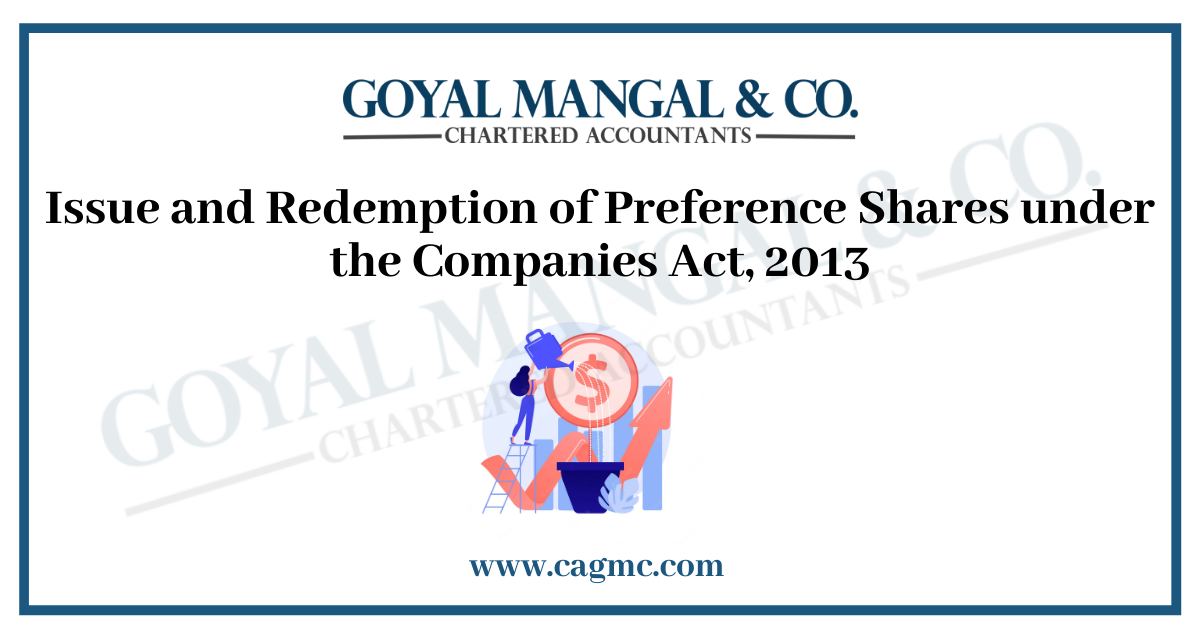
In each company, there are two types of shares: Equity Shares or Common Stock and Preference Shares or Preferred Stock. Equity Shareholders are regarded as the true owners of the company since they have voting rights, although preference shareholders do not have voting rights on all resolutions under normal circumstances. However, if a dividend on preference shares has not been paid for two years or longer, that class of preference shareholders has the right to vote on all resolutions put before the company. Preference shareholders are given first preference in dividend payments and repayment in the event of a liquidation. The dividend rate on equity shares varies year to year since it is determined by the amount of earnings available to the company. Preference Shares, on the other hand, pay a predetermined rate or a fixed amount as dividend. In this article, we’ll discuss Issue and Redemption of Preference Shares.
Preference Shares Issue under Issue and Redemption of Preference Shares
Section 55 of the Companies Act, 2013 (the “Act”), read in conjunction with Rule 9 of the Companies (Share Capital and Debentures) Rules, 2014, authorises a company to issue redeemable preference shares. The issue of irredeemable preference shares is prohibited under Section 55(1).
Duration of Redeemable Preference Shares
A Company limited by shares may issue preference shares that are redeemable within 20 years after the date of issuance, according to Section 55(2) of the Act. A company engaged in the establishment and management of infrastructure projects may issue preference shares for a period exceeding 20 years but not exceeding 30 years, subject to the redemption of a minimum of 10% of such preference shares per year beginning with the 21st year or earlier, on a proportionate basis, at the preference shareholders’ option. The phrase “infrastructure projects” refers to the projects listed in Schedule VI of the Companies Act, 2013.
Conditions and Pre-condition for issue of Preference Share
The following are the conditions prevailing for the issue of Preference Share:
Pre- Condition for issue of Preference Share
A company’s Articles of Association must permit it to issue preference shares. If the Articles of Association do not authorise or are silent, they must first be modified.
Conditions prevailing for issue of Preference Share
A company with a share capital may issue preference shares if the following requirements are met:
- The issuance of such shares has been approved by a special resolution passed by the company’s general meeting. As a result, the Company must seek prior shareholder approval by Special Resolution.
- The Company has no outstanding defaults in the redemption of preference shares issued before or after the beginning of this Act, or in the payment of dividends payable on any preference shares at the time of such issuance of preference shares.
- A company that issues preference shares must provide information in the resolution on the following issues:
- The order of payment of dividends or return of capital in relation to equity shares;
- Involvement in the surplus fund
- Involvement in winding-up excess assets and earnings that may remain after the full capital has been returned;
- Dividend payment on a cumulative or non-cumulative basis
- The conversion of preference shares into common stock the right to vote
- Preference shares must be redeemed.
- The explanatory statement to be affixed to the general meeting notice in accordance with section 102 shall, amongst many other things, contain the whole material facts involved with and relevant to the issuing of such shares, including-
- The amount of the offering, the number of preference shares to be issued, and the nominal value of each share;
- The type of such shares, i.e. cumulative or non-cumulative, participating or non-participating, convertible or non-convertible the issue’s goals
- Mechanism through which shares are issued;
- Anticipated price at which such shares would be issued;
- Foundation upon which the price was determined;
- The terms of issuance, such as the terms and rate of dividend on each share, and so on;
- Redemption conditions, including the redemption tenure, redemption of shares at a premium, and, if the preference shares are convertible, the conversion terms;
- The mechanism and forms of redemption; the company’s present ownership arrangement
- The company’s current ownership arrangement;
- The estimated dilution in equity share capital as a result of preference share conversion.
Method for Issue of Preference Share
The following are the procedure for issue of preference share:
- Step 1: Check to see if the Articles of Association provide a provision for the issue of preference shares. If not, revise the AOA first.
- Step 2: Call a Board of Directors Meeting for the following purposes:
- If necessary, enhance the authorised preference share capital;
- To authorise the issuing of preference shares;
- To call a General Meeting to seek shareholder approval.
- Step 3: Call a Annual General Meeting for the following reasons:
- If necessary, enhance the Authorized Preference Share Capital.
- To authorise the issuing of preference shares by a Special Resolution.
- Step 4: Submit form MGT-14 to the Registrar of Companies within 30 days of shareholder approval, accompanied with a copy of the Special Resolution and Explanatory Statement.
- Step 5: Receive Application Money for Preference Shares through Banking Channels
- Step 6: Allocate the preferred shares within 60 days after receiving the application money. Allotment can take place by the board, a committee, or even an authorized individual.
- Step 7: Submit form PAS-3 within 15 days or 30 days, depending on the circumstances, from the date of allocation.
- Step 8: Prospective preference shareholders must grant a share certificate, i.e. (Form SH-1) within two months after the date of allocation.
Preference Shares Redemption
A company may redeem its preference shares only under the circumstances under which they were issued:
- At a predetermined time or on the occurrence of a certain event; or
- Further, at the company’s discretion.
Only fully paid preference shares may be redeemed.
Preference shares will be redeeming from the following categories:
- Profits of the company that may be available for dividends or distribution
- Out of the proceeds of a new issue of shares made for the purpose of such redemption; the new issuance of shares might be of equity, preference, or both.
Redemption from the Company’s profit
Where Preference shares are proposed to be redeemed from the company’s profits, a sum equal to the nominal amount of the shares to be redeemed shall be transferred from such profits to a reserve to be known as the Capital Redemption Reserve Account, and the provisions of this Act relating to the reduction of a company’s share capital shall apply as if the Capital Redemption Reserve Account were paid-up share capital of the company. The capital redemption reserve account may be used by the company to pay up unissued shares of the company that will be issued to company members as fully paid bonus shares.
Preference Share Redemption Premium
The premium due on redemption of Preference shares must be payable from the Company’s profits solely. However, in the following two situations, premium due on Preference shares can be payable from the Securities Premium Account in addition to the P&L Account:
- Preference shares issue on or before the effective date of this Act must be redeem.
- If the company fails to meet the accounting standards.
In case a company is unable to redeem a Preference Share
When a company is unable to redeem any preference shares or pay any dividends on such shares in line with the conditions of issue, such shares take the form of ‘unredeemed preference shares’. A Company may, with the consent of the holders of 3/4th of the value of such preference shares and the approval of the National Company Law Tribunal (NCLT) on a petition made by it in this regard, issue further redeemable preference shares equal to the amount due, including the dividend thereon, in respect of the unredeemed preference shares, and upon the issue of such further redeemable preference shares, the unredeemed preference shares shall be deem to have redelivered.
The NCLT shall immediately order the redemption of preference shares held by people who have not consented to the issuance of further redeemable preference shares.
Takeaway
Preference shares are an ideal instrument for a company looking for an investment that does not dilute voting rights or control over the company. At the same time, it provides preference stockholders with a guaranteed income as well as dividend and repayment priority.


